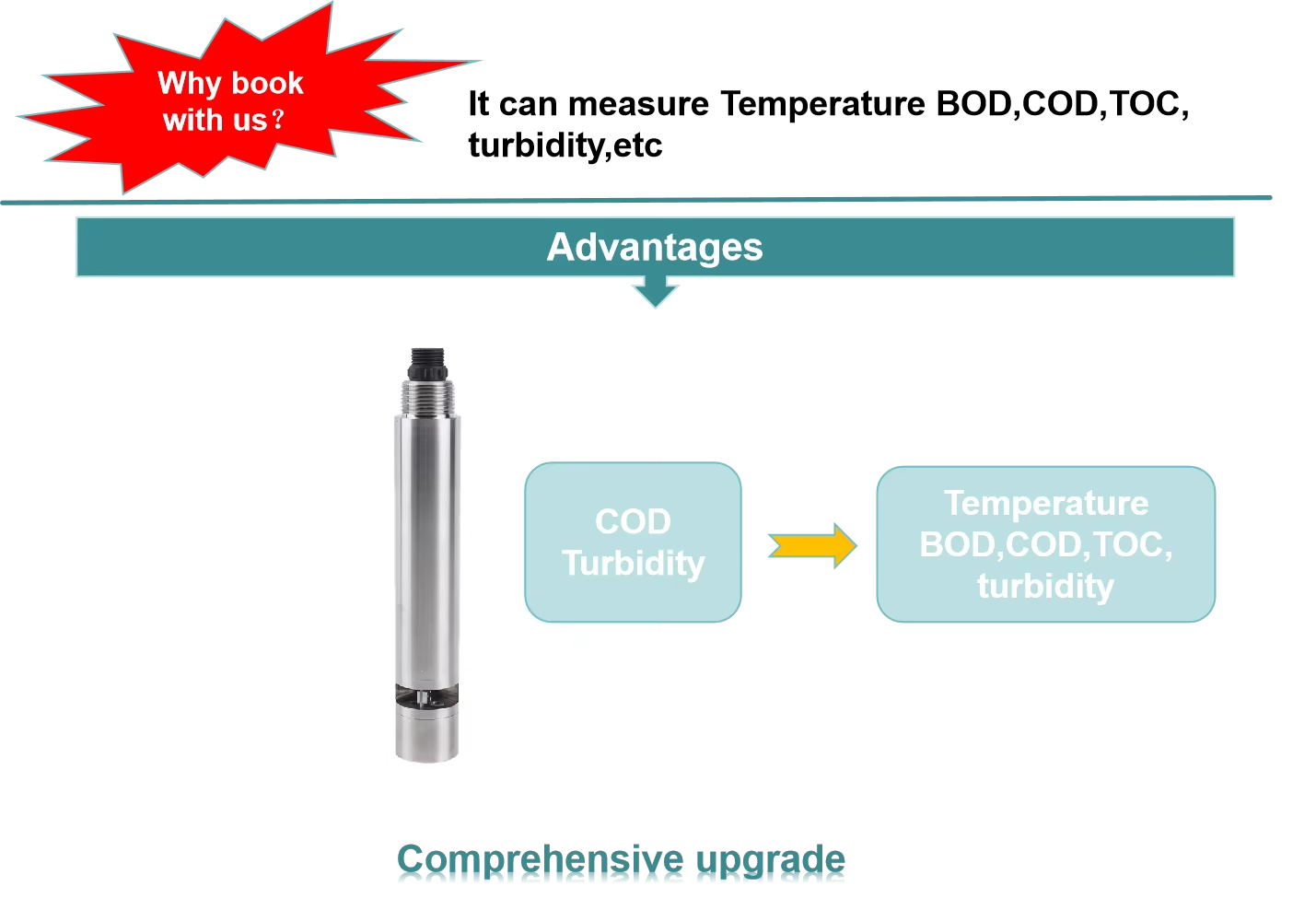Petsa: Pebrero 21, 2025
Lokasyon: Madrid, Espanya
Sa bag-ohay nga mga tuig, ang Espanya nakasaksi sa usa ka dakong pagbag-o sa mga sektor sa agrikultura ug medisina, nga kadaghanan gimaneho sa pagsagop sa mga abante nga teknolohiya sa pagmonitor sa kalidad sa tubig. Lakip niini, ang mga sensor nga nagsukod sa Chemical Oxygen Demand (COD), Biological Oxygen Demand (BOD), Total Organic Carbon (TOC), turbidity, ug temperatura mitumaw isip mga hinungdanon nga himan. Ang ilang paghiusa sa mga pamaagi sa industriya nag-usab sa kung giunsa pagduol sa mga industriya ang pagdumala sa tubig, pagpadayon, ug mga resulta sa kahimsog sa usa ka paspas nga nagbag-o nga talan-awon.
Pagpalambo sa mga Pamaagi sa Agrikultura
Sa konteksto sa industriyal nga agrikultura, ang pagmintinar sa taas nga kalidad nga tubig hinungdanon alang sa produktibidad sa tanom ug kahimsog sa yuta. Ang mga mag-uuma sa tibuok Espanya nagkadaghan nga naggamit sa mga sensor sa kalidad sa tubig aron mabantayan ang integridad sa mga sistema sa irigasyon ug masiguro ang labing maayo nga mga kondisyon alang sa pagtubo sa mga tanom.
1. Pagsiguro sa Kalidad sa Tubig para sa Irigasyon
Ang mga sensor sa kalidad sa tubig nagtugot sa mga mag-uuma sa pagtimbang-timbang sa lebel sa mga kontaminante ug organikong mga materyales sa mga tinubdan sa tubig sa irigasyon. Ang taas nga lebel sa COD ug BOD mahimong magpakita sa presensya sa mga organikong polusyon nga mahimong makadaot sa mga tanom. Pinaagi sa pagmonitor niining mga parametro sa tinuod nga panahon, ang mga mag-uuma makahimo og mga lakang sa pagtul-id—sama sa pagpatuman sa mga sistema sa pagsala o pagpili og alternatibong mga tinubdan sa tubig—sa ingon mapanalipdan ang kahimsog sa tanom ug masiguro ang mas taas nga ani.
2. Pag-optimize sa Paggamit sa Kapanguhaan
Ang paghiusa sa mga sensor sa turbidity ug temperatura dugang nga nakapausab sa mga pamaagi sa irigasyon. Ang mga pagsukod sa turbidity makatabang sa pagtino sa katin-aw sa tubig, nga nagpakita sa presensya sa mga nagbitay nga partikulo ug mga mikroorganismo. Kini nga impormasyon hinungdanon alang sa paghimo og mga desisyon nga may kahibalo bahin sa pagtambal sa tubig, nga sa katapusan mosangpot sa mas maayong paggamit sa kahinguhaan ug pagkunhod sa basura. Samtang, ang mga sensor sa temperatura naghatag og mga panabut sa mga kondisyon sa tubig nga hinungdanon alang sa pamatasan sa tanom, labi na sa kritikal nga mga yugto sa pagtubo.
Mga Pag-uswag sa Pag-atiman sa Medikal
Ang sektor sa medisina sa Espanya susamang nakabenepisyo gikan sa pag-deploy sa mga state-of-the-art nga sensor sa kalidad sa tubig. Sa mga ospital ug mga pasilidad sa pag-atiman sa panglawas, ang pagmintinar sa sterile ug luwas nga suplay sa tubig hinungdanon alang sa kaluwasan sa pasyente ug kaepektibo sa pagtambal.
3. Pagmonitor sa Kalidad sa Tubig para sa Kaluwasan sa Pasyente
Ang mga tighatag og serbisyong panglawas naggamit og mga sensor sa COD, BOD, ug TOC aron masiguro nga ang tubig nga gigamit para sa mga pamaagi sa medikal, operasyon, ug mga pagsulay sa laboratoryo makasunod sa estrikto nga mga sumbanan sa kaluwasan. Pinaagi sa hugot nga pagmonitor niining mga parametro, ang mga institusyong medikal makapugong sa mga impeksyon nga dala sa tubig ug makasiguro nga ang tanang proseso sa medikal nga gihimo gamit ang tubig luwas ug sterile.
4. Pagtubag sa Emerhensya ug Panglawas sa Publiko
Atol sa mga emerhensya sa panglawas sa publiko, sama sa pag-ulbo sa mga sakit o natural nga mga katalagman, ang pagmonitor sa kalidad sa tubig mahimong mas kritikal. Ang paspas nga pagtimbang-timbang sa mga parametro sa kalidad sa tubig nagtugot sa mga pasilidad sa pag-atiman sa panglawas sa pagtubag dayon sa mga potensyal nga hulga sa kontaminasyon, nga nanalipod dili lamang sa mga pasyente apan lakip usab sa mas lapad nga komunidad.
Pagpasiugda sa Malungtarong mga Pamaagi
Ang pagduso alang sa pagkamalungtaron usa ka komon nga hilo nga nagkonektar sa duha ka sektor. Ang mga sensor sa kalidad sa tubig nakatampo sa mas episyente nga mga pamaagi sa pagdumala sa tubig, nga nagpalambo sa kalig-on sa agrikultura ug mga panalipod sa panglawas sa publiko. Samtang ang Espanya nakigbisog sa pagbag-o sa klima ug kakulang sa mga kahinguhaan, ang papel niining mga sensor labi ka hinungdanon.
Pagsuporta sa Pagsunod sa mga Regulasyon
Ang duha ka industriya gipailalom sa estrikto nga mga regulasyon bahin sa kalidad ug kaluwasan sa tubig. Ang datos nga gihatag sa COD, BOD, TOC, turbidity, ug temperature sensors dili lamang makatabang sa pagsunod sa lokal ug European Union nga mga regulasyon apan makatabang usab sa mga organisasyon nga ipakita ang ilang pasalig sa pagdumala sa kalikupan ug kaluwasan sa publiko.
Konklusyon
Ang paghiusa sa mga sensor sa pagmonitor sa kalidad sa tubig usa ka testamento sa inobatibong espiritu nga nagduso sa mga sektor sa agrikultura ug pag-atiman sa panglawas sa Espanya. Pinaagi sa pagpalambo sa pagdumala sa tubig, pagpasiugda sa pagpadayon, ug pagsiguro sa kaluwasan, kini nga mga teknolohiya dili lamang nagpauswag sa kahusayan sa operasyon apan adunay usab hinungdanon nga papel sa pagpalambo sa pagsalig sa publiko ug responsibilidad sa kalikopan. Samtang ang Espanya nagpadayon sa pag-uswag niini nga mga natad, ang epekto niini nga mga sensor molambo pa, nga magbukas sa dalan alang sa usa ka mas himsog ug mas malungtarong kaugmaon.
Alang sa dugang nga impormasyon bahin sa mga inobasyon sa kalidad sa tubig o aron masusi ang mga pakigtambayayong sa teknolohiya, giawhag ang mga hingtungdan sa industriya nga kontakon ang tagsatagsa ka departamento sa agrikultura ug panglawas sa tibuok Espanya.
Para sa dugang impormasyon bahin sa sensor sa kalidad sa tubig,
palihug kontaka ang Honde Technology Co., LTD.
Email: info@hondetech.com
Website sa kompanya: www.hondetechco.com
Oras sa pag-post: Pebrero 21, 2025


